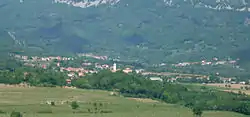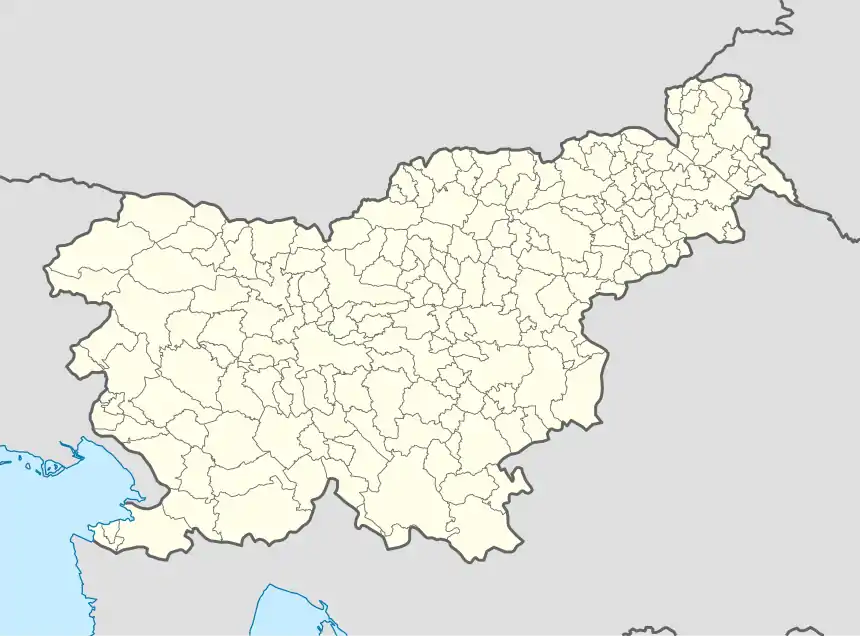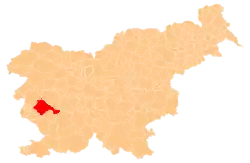Lokavec, Ajdovščina
Lokavec (pronounced [lɔˈkaːʋəts]) is a settlement on the northern edge of the Vipava Valley northwest of Ajdovščina in the Littoral region of Slovenia.[2] It lies below the slopes of Mount Čaven, below the Slano Blato Landslide. It includes the hamlets of Bitovi, Brith (or Britih[3]), Čohi, Gorenje, Kuši, Lahovše, Loretovše, Mizinška Vas (Slovene: Mizinška vas), Paljki (or Palki[3]), and Slokarji.[4]
Lokavec | |
|---|---|
 | |
 Lokavec Location in Slovenia | |
| Coordinates: 45°54′7.56″N 13°52′40.87″E | |
| Country | |
| Traditional region | Littoral |
| Statistical region | Gorizia |
| Municipality | Ajdovščina |
| Area | |
| • Total | 13.74 km2 (5.31 sq mi) |
| Elevation | 173 m (568 ft) |
| Population (2002) | |
| • Total | 1,002 |
| • Density | 73/km2 (190/sq mi) |
| [1] | |
Name
Lokavec was first attested in written sources in 1086 as Locunz and Locarizz. The name is derived from the adjective *lǫkavъ 'twisted, winding' or from the common noun *lǫkava 'curve, twist', perhaps originally a hydronym.[5]
History
The discovery of Celtic grave sites in Lovavec shows that it was already settled in prehistoric times. The Celtic settlement there had a defensive structure built on Gradišče Hill.[4]
During the Second World War, German forces arrested all of the men in the settlement capable of bearing arms and sent them to perform forced labor.[4]
Mass grave
Lokavec is the site of a mass grave from the period immediately after the Second World War. The Lokavec Mass Grave (Slovene: Grobišče Lokavec) is located in a field 600 meters (2,000 ft) west of the settlement. It contains the remains of five to seven Slovenian civilians murdered around 20 June 1945.[6][7][8]
Postwar
Lokavec annexed the formerly independent settlement of Dolnji Lokavec in 1952.[9]
Churches
There are three churches in the village: the parish church, belonging to the Koper Diocese and dedicated to Saint Lawrence, a second church dedicated to Saint Urban,[10] and a church dedicated to St. Mary of the Assumption.
Notable people
Notable people that were born or lived in Lokavec include:
References
- Statistical Office of the Republic of Slovenia
- Ajdovščina municipal site Archived 2011-05-15 at the Wayback Machine
- Spezialortsrepertorium der österreichischen Länder. Bearbeitet auf Grund der Ergebnisse der Volkszählung vom 31. Dezember 1910, vol. 7: Österreichisch-Illyrisches Küstenland. Vienna: K. k. Hof- und Staatsdruckerei. 1918. p. 13.
- Savnik, Roman (1968). Krajevni leksikon Slovenije, vol. 1. Ljubljana: Državna založba Slovenije. p. 24.
- Snoj, Marko (2009). Etimološki slovar slovenskih zemljepisnih imen. Ljubljana: Modrijan. p. 244.
- Lokavec Mass Grave on Geopedia (in Slovene)
- Ministrstvo za delo, druţino in socialne zadeve. 2007. Poročilo Ministrstva za delo, druţino in socialne zadeve o izvajanju predlogov komisije vlade republike slovenije za reševanje vprašanj prikritih grobišč v letu 2007. Ljubljana.
- Ferenc, Mitja, & Ksenija Kovačec-Naglič. 2005. Prikrito in očem zakrito: prikrita grobišča 60 let po koncu druge svetovne vojne. Ljubljana: Muzej novejše zgodovine, p. 124.
- Spremembe naselij 1948–95. 1996. Database. Ljubljana: Geografski inštitut ZRC SAZU, DZS.
- Koper Diocese list of churches Archived 2009-03-06 at the Wayback Machine
External links
 Media related to Lokavec, Ajdovščina at Wikimedia Commons
Media related to Lokavec, Ajdovščina at Wikimedia Commons- Lokavec at Geopedia
